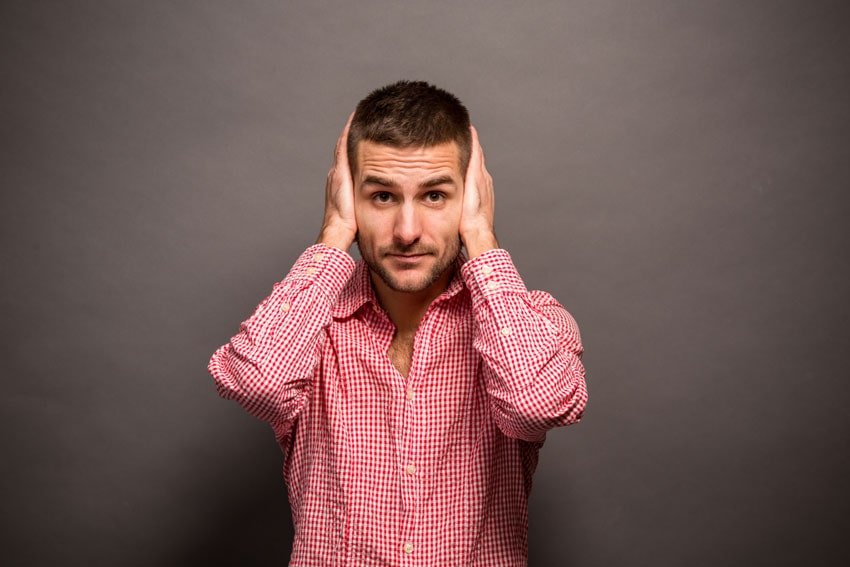How to Stop Ringing in Ears

It’s not unusual for people to experience ringing in their ears from time to time. You may have heard the superstition “your ears ring when someone is talking about you,” but there are actual medical reasons as to why your ears ring. Some a simple fix, while others may be incurable. But, figuring out why your ears are ringing and when to worry is the first step.
If your ears ring for less than a minute every once in a while, you shouldn’t worry. That happens from time to time. If your ears ring very loudly, sound like static or buzzing, or make noise for days at a time, look into possible causes. It could be a sign of something that needs treatment.
Possible Causes of Tinnitus
Ear ringing is medically called “tinnitus.” Different doctors treat different causes of tinnitus, so knowing some possible causes and symptoms can help you narrow down who to call.
Ear Buildup
Sometimes ringing comes from something as simple as a build-up of ear wax, water caught in your ears, or some other kind of blockage that physicians can easily remove.
Ear wax is essential for our ears. Without it, the inside of our ears would be dry and itchy. It traps dust and other foreign particles and has anti-bacterial properties that help keep our ears healthy. When you move your jaw to chew, talk, and laugh, old earwax is moved closer to the outside of the ear, dries up, and falls out. If you have a build-up of earwax deep in your ear by your eardrum, you likely used a Q-Tip to try and remove it and accidentally pushed it further. Ideally, your ears don’t need cleaning, but if you had cleaned them and moved wax too far in, try using a hot washcloth. The steam will soften the wax and work its way out. Avoid pointy objects, Q-Tips, and ear candles.
Water caught in your ear is generally easy to remove, too, just lay on your side, and it will work its way out. If you feel you have a different blockage in your ear, don’t try to remove it yourself. Visit your physician for assistance.
Medications
Some medications might affect your ears. Certain antibiotics, high doses of aspirin, chemotherapy, and anti-depressants might cause ringing in your ears. If you are on medication, look carefully at the side effects. You may find that tinnitus is one of the common side effects and could talk to your doctor about switching to a different medication or how you can stop ringing associated with medicine.
Head and Neck Injuries
Head and neck injuries are a common cause of tinnitus. From concussions to whiplash to traumatic brain injuries, ear ringing could be a constant companion. If you’ve hit your head or hurt your neck and are experiencing ringing, you may have damaged your inner ear, ear nerves, or the part auditory cortex.
Hearing Loss
In most cases, your ears ring due to hearing loss which is, in part, natural as you get older. There are tiny hairs in your ears that detect sound waves and trigger your auditory nerve, which signals your brain to interpret. These hairs can bend and break, causing random impulses to your brain that sound like ringing to you.
Hearing loss can occur from loud noises, viral infections, injuries, and more.
Temporomandibular Joint Disorder (TMJ)
A common cause of ear ringing is a temporomandibular joint disorder called TMJ. TMJ is an imbalance in your jaw caused by injury to your jaw, teeth grinding, stress, arthritis, or genetics. Tinnitus due to TMJ is usually accompanied by other symptoms like jaw, ear, face, head, and neck pain jaw clicking or popping, and limited jaw mobility. In some cases, you can experience the alarming case of lockjaw.
The largest of your cranial nerves runs through your temporomandibular joint. This joint sits on either side of your head, right below your ears. Inflammation of this joint and nerve can cause ear pain and ringing in your ears.
Other Effects of Untreated TMJ
If left untreated, TMJ can cause more than ringing in your ears. Untreated TMJ leads to a host of other problems such as chronic pain in your jaw, neck, and shoulders, migraines and headaches, damage to your jaw joint, hearing loss, development of sleep apnea, and depression.
Don’t let TMJ rule your life. Get treatment right away..
Your Life with TMJ Treatment
Treating your TMJ can sound overwhelming, but it doesn’t have to be. Your Tulsa TMJ dentist can treat your TMJ, and you can get your life back. With chronic pain, it’s hard to enjoy your life, but after treatment, you can go back to enjoying your hobbies, spending quality time with friends and family, and excelling in your professional life.
With the non-surgical TMJ treatment offered at èlan by Megan Hodges, we can restore your bite and neuromuscular function. Say goodbye to ear ringing and other TMJ symptoms today by calling (918) 528-3330 or making an online appointment.

élan Tulsa Cosmetic Dentistry
10031 S Yale Ave #104
Tulsa, OK 74137

